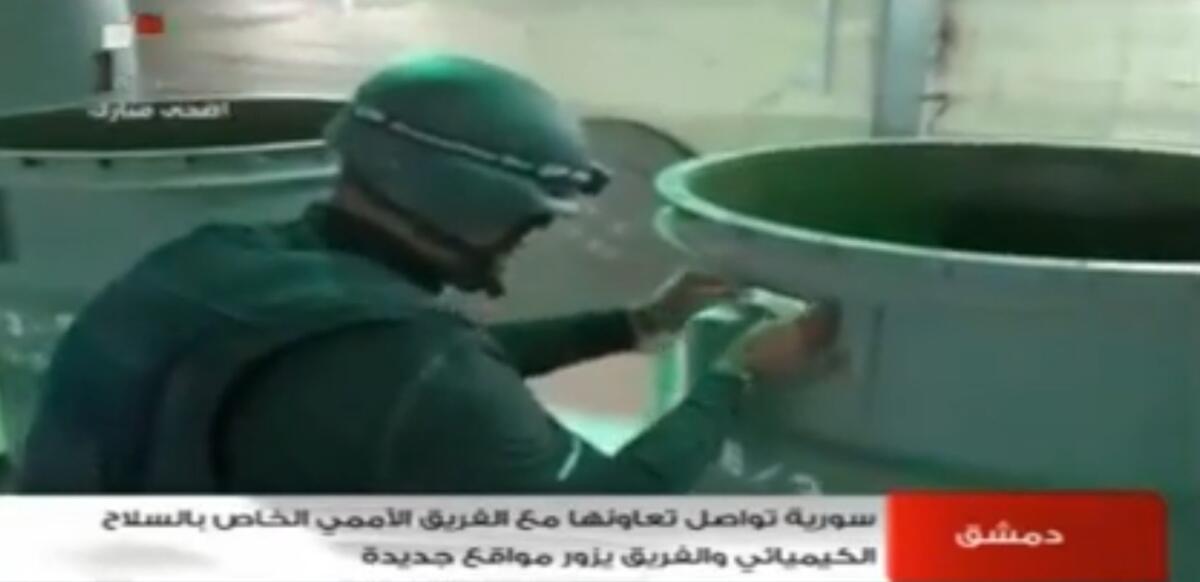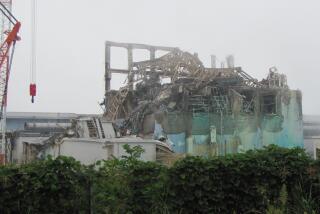Syria meets deadline for plan to destroy chemical arsenal

- Share via
GAZIANTEP, Turkey — The Syrian government has met an international deadline to submit a detailed declaration of its chemical weapons facilities and a plan to destroy the nation’s toxic arsenal, the group overseeing the disarmament process said Sunday.
Syria had until Sunday to present its declaration and the related proposal for destruction to the Organization for the Prohibition of Chemical Weapons, the Hague-based organization supervising the elimination of Syria’s chemical stockpiles. Syria had already provided an initial inventory of its chemical sites, but the new filing is considered more comprehensive and detailed.
In a news release, the OPCW said Sunday that Syria had submitted the required documentation on Thursday. The statement did not come as a surprise. OPCW officials have repeatedly praised Syria for its cooperation and had predicted that the Oct. 27 deadline would be met.
No details of the Syrian government’s submission were made public.
In general, the OPCW said, such declarations “provide the basis on which plans are devised for a systematic, total and verified destruction of declared chemical weapons and production facilities.”
Syria’s plan for destruction will now go before the OPCW’s executive council for consideration, the agency said.
International inspectors have been in Syria since Oct. 1 in the start of an ambitious, United Nations-backed mission to destroy Syria’s chemical stockpiles by mid-2014.
The undertaking is considered unprecedented because it is being carried out in the midst of a civil war.
The OPCW faces a looming deadline of Friday, Nov. 1 to end Syria’s ability to produce chemical weapons. Inspectors have been working to render inoperable all equipment needed to mix and fill chemical agents into munitions. Officials say they have made considerable progress and expect to meet Friday’s deadline.
Inspectors in Syria have already visited 19 of the 23 chemical weapons sites initially identified by Syrian authorities, the international agency says. Several sites are reported to be near conflict zones and may require limited cease-fires to enable access for technical personnel, according to the OPCW, which was awarded the 2013 Nobel Peace Prize for its disarmament work.
A considerable amount of equipment — including unarmed missile warheads, bombs and mixing and filling machinery — has already been destroyed, mostly using low-tech equipment such as sledgehammers, chain saws and bulldozers, the OPCW has said.
The more complex task — the destruction of actual toxic agents — lies ahead. Authorities are considering a number of options, including incineration. Whether the material will be all be destroyed in Syria or will be transported outside the country for elimination remains unclear.
The disarmament proposal emerged from a U.S.-Russia plan that helped avert threatened U.S. airstrikes on Syria in retaliation for the government’s alleged use of poison gas in a series of attacks on Aug. 21 targeting rebel-held suburbs of Damascus. Syrian authorities denied the gassing but agreed to the elimination of the nation’s chemical stockpiles, estimated at some 1,000 metric tons, including mustard gas, a blistering agent; and sarin, a nerve agent.
ALSO:
Bombings hit Indian city but fail to stop massive political rally
Saudi officials set up roadblocks against women’s ‘drive-in’ protest
Egypt crackdown complaint against Nobel laureate tossed out by judge
More to Read
Sign up for Essential California
The most important California stories and recommendations in your inbox every morning.
You may occasionally receive promotional content from the Los Angeles Times.










